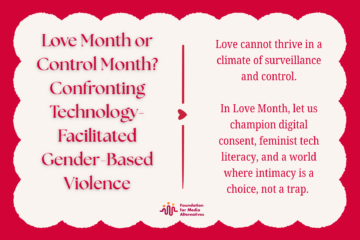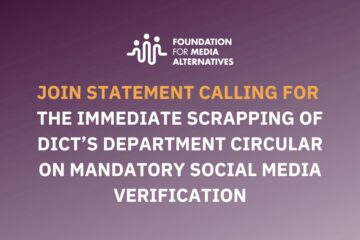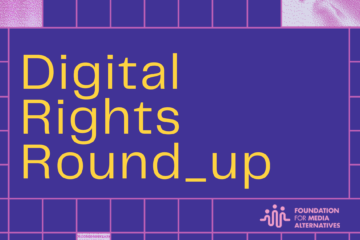Understanding Technology-Facilitated Gender Based Violence
Published by Foundation for Media Alternatives (FMA) on
Understanding TFGBV

“Am I a victim of TFGBV? What even is TFGBV?” Technology-Facilitated Gender-Based Violence (TFGBV) is a new and necessary term that emerged in response to the rapid growth of technology and its harms on people’s lives. Over the years, digital rights advocates may have used terms like cyberbullying or online gender-based violence. But as online crimes against women become more prevalent, it has become evident that these outdated terms no longer capture the complexity and severity of the gender-focused abuse happening through the use of technology and across digital spaces.
TFGBV recognizes that all kinds of gender-based violence can occur across a range of digital platforms and tools. This includes violence done through social media platforms, messaging apps, artificial intelligence, online gaming, etc. This means that online harassment, non-consensual image sharing, doxxing, deepfakes, and other forms of digital harm that target individuals based on gender can be considered TFGBV.
Aside from these, there are many other types of TFGBV, some of which can extend even to offline harms. Here are some examples of the key types to get an idea of what counts as TFGBV:
- Threats of Violence refers to online threats (physical) particularly targeting women or LGBTQI+ communities
- Violence in Online Pornography or Hostile Sexual Environments refers to sexualized content aimed at reinforcing gendered violence or stereotypes
- Gendered Discrimination refers to sexist, homophobic jokes or memes made online
- Gendered Trolling refers to persistent, organized attacks aimed at silencing or provoking targeted genders
- Gendered Misinformation/Disinformation refers to purposeful spreading of false or manipulated content
- Gendered Swatting refers to calling false reports to police or emergency services
At FMA alone, we have documented a total of 795 cases across the Philippines over the 12 years of mapping cases of online violence against women. Based on the 2025 mid-year report, 57 new TFGBV cases were recorded, with 21 of the 57 cases involving online sextortion, 19 involving cases of online sexual abuse and exploitation of children (OSAEC), 9 involving non-consensual photo or video sharing, and 6 cases recorded for online trafficking and exploitation. 5 incidents of online harassment, slander, or extortion were also reported, as well as 1 case each for deepfake abuse and online sexual harassment. This notes a significant increase from the 23 cases documented from January to December 2024.
Even with the growing number of cases, we must also recognize that countless cases remain undocumented due to several gaps. For instance, access to proper support, whether government, legal, or psychosocial, may be inaccessible or insufficient in some communities. Lack of knowledge of the proper reporting channels may also hinder a victim of TFGBV from reporting their case, and the lack of knowledge of TFGBV in general may make victims feel isolated, unsupported, and unable to report the violence they’ve experienced.
Recognizing these forms of TFGBV is essential in highlighting how digital spaces are being weaponized to silence, target, and intimidate women, ultimately creating an online environment where women feel unsafe and threatened. By understanding the range of behaviours that constitute TFGBV, we can better identify ways to support victims and push for meaningful change in the systems that enable this violence. By naming and understanding what can be considered as TFGBV, we take an important step towards addressing it. In the fight against TFGBV, we call for stronger protections, survivor-centered approaches, and support, accountability, and transparency from tech companies and governments to ensure that victims of TFGBV are brought justice.
Help is always available. If you, or know someone who would like to seek help, kindly email our dedicated TFGBV helpline at tfgbv.helpline@proton.me or the Philippine National Police Anti-Cybercrime Group at pnp.acg.wwcpu@gmail.com. For more of our trusted resources, partner organizations, and helplines, kindly refer to this post.
Get informed about TFGBV by following the Foundation for Media Alternatives Facebook page and website. #VAWFreePH #StopTFGBV #DigitalSecurityPH #EndVAW



0 Comments